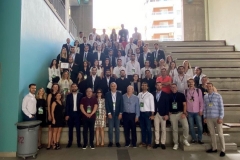
İŞLETME FAKÜLTESİ
Lojistik Yönetimi
2011-2012 Bahar Dönemi Lisansüstü Sunumları
DEPARTMENT OF LOGISTICS MANAGEMENT
GRADUATE PRESENTATIONS
(GSS500 SEMINAR & LOG597 TERM PROJECT & LOG599 THESIS)
June 1st, 2012, Friday
13:00-16:50, C306
Presentation Program
13:00-13:30 İsmail Onur KAMUK
An Analysis of Joint Procurement Implementations
13:30-14:00 Tuğçe ÇEVİK
Analyzing a Freight Village from the Perspective of a Logistics Firm
14:00-14:10 Break
14:10-14:40 Özge AKINCI
Collaboration Opportunities among Third Party Logistics Providers
14:40-15:10 Aşkın ÖZUĞURLU
Supplier Evaluation Methodology in Service Purchasing
15:10-15:20 Break
15:20-15:50 Ahu YİĞİTTEKİN
Information Technologies Outsourcing Process for Freight Forwarders in Turkey: An Analysis
15:50-16:20 Tunca TABAKLAR
A Unified Framework of Business and Humanitarian Logistics for Natural Disaster Management
16:20-16:50 Cansu KANDEMİR
Impacts of Supply Chain Design Parameters on Retailer In-Store Logistics Performance
Abstracts
An Analysis of Joint Procurement Implementations
İsmail Onur KAMUK
Supervisor: Muhittin Hakan DEMİR
Companies are in an ongoing attempt to minimize their costs. Utilizing advantages of economies of scale is one of the most common approaches for cost reductions. One important example is economies of scale in purchasing. Companies that produce in high amounts or groups of sister-companies with a common purchasing organization already purchase in large amounts, and enjoy the benefits of economies of scale. On the other hand, small size firms procure in smaller volumes, that leads to several other inefficiencies as well as higher prices. One implementation to overcome these disadvantages is the practice of joint procurement. In joint procurement, a group of companies combine their purchases over a subset of their suppliers. Joint procurement may involve purchasing of goods or services, or both. In this study, we analyze several practices of joint procurement. We plan to reveal the outcomes, advantages, disadvantages of joint procurement with respect to different joint procurement structures.
Analyzing a Freight Village from the Perspective of a Logistics Firm
Tuğçe ÇEVİK
Supervisor: Ahmet CAMCI
In the last few decades two important trends which have been in the focus of logistics management researchers and practitioners are intermodal freight transportation and designing the distribution networks as hub-and-spoke networks. Globalization, along with many others, is the major factor which stimulates the rise of these issues. The efforts to combine these two issues in a single framework led the idea of a logistics center. The concept of logistics centers has developed in the years as a consequence of changes in trade, specialization in logistics and cargo handling. Logistics centers increase the attractiveness of the market and competitiveness of the companies, as well as establishing a good reputation through improvement by focusing on integrated transportation and distribution network. The logistics centres services can be categorized as basic services, ancillary services, and value-added services. There are also supporting activities that enable logistics centers’ services. The concept of logistics centers includes both hardware aspects; e.g. facilities and equipments and software aspects; e.g. information communication technology. The definition of freight village points refers to a more extensive logistics centre with enhancements in geographic coverage and transport modes.
In recent years many examples of freight villages have had presence in all over the world. In our work we investigate the developing concept of logistics centre and study on the motives of a logistics firm to take part in logistics centers. We will demonstrate a model mainly focused on operating costs to understand the contribution of freight villages to the firms.
Collaboration Opportunities among Third Party Logistics Providers
Özge AKINCI
Supervisors: Öznur YURT, Özgür ÖZPEYNİRCİ
Since supply chain partners’ relationship and collaboration is examined, there seems to be a lack of research on the collaborative relationship between third party logistics (3PL) providers. By the raising competition and globalization, supply chain members tend to generate collaborative relationships in order to have strong position in the market. This study analyzes collaboration forms and structures between 3PL providers by analyzing logistics sector, benefits and challenges of collaboration, collaboration forms, and applications. Until now, literature review part and best practices in the world and also in Turkey is prepared.
We define the methodology and try to find benefits and challenges, key success determinants of vertical integration. The main purpose of this study is researching different perspectives related with the cooperation of third party logistics.
Supplier Evaluation Methodology for Service Purchasing
Aşkın ÖZUĞURLU
Supervisor: Muhittin Hakan DEMİR
With the increase of competition, supplier selection and supplier evaluation gained higher importance in purchasing, which is an important function of supply chains. Through the new dynamics of business, it is now clear that selecting right supplier is no more sufficient for getting maximum performance from suppliers. Correct measurement of the supplier performance and managing the supplier relations has become an essential requirement.
Supplier evaluation schemes developed with reference to material purchasing approach have been developed both in academic framework and in business framework. With the increase in service offerings in the early 2000’s, necessity of service evaluation has become evident. However, since the service evaluation methodologies have been converted from material evaluation criteria, they do not fit into specific requirements. Thus, a new methodology needs to be sought.
The main goals of this research are to develop an effective supplier’s evaluation system for service purchasing and to utilize the results of this system to increase the supplier management. The first step in the development of such a system is to determine which subset of suppliers are to be included in the critical evaluation process (who to evaluate). We then determine supplier categories, overview evaluation criteria, and define new sub-criteria. We also make a revision of evaluation questions to cover service purchasing.
The findings of the study will also be utilized as an input to the design of an integrated supplier management software.
Information Technologies Outsourcing Process for
Freight Forwarders in Turkey: An Analysis
Ahu YİĞİTTEKİN
Supervisor: Öznur YURT
The aim of this study is to develop a managerial approach about information technologies by analyzing the assessment of information technologies outsourcing process of freight forwarders in Turkey.
The freight forwarders’ basic role is, by considering their customers’ needs and requests, to manage the door-to-door transportation by determining the most convenient and most efficient transportation mode and to be a solution to their customers’ needs. But it should be noticed that freight forwarders’ suppliers might be the direct service providers’ to the customers, instead of using freight forwarders’ services. Under these circumstances freight forwarders’ difference is not only to consolidate or organize the transportation but to use efficient information technology to support their services and to support their decision making process. IT system is crucial, if the freight forwarders are to survive in the future in this competitive world. To collect comments from logistics sector to understand IT investment attitude of companies and to understand how they can calculate their return on investment, the study began using interview method. The analyses of interviews are used to develop a management theory for freight forwarder outsourcing process and a focus group used to study the acquired theory.
There are lots of researches and contributions about information technologies; it is hard to say new things as long as to find specific, certain results. But the outputs of this study would also give contributions to develop a management approach about IT investments benefits, considering decision making process and evaluation process after decision.
A Unified Framework of Business and Humanitarian Logistics
for Natural Disaster Management
Tunca TABAKLAR
Supervisor: Muhittin Hakan DEMİR
The new business era defined by the highly globalized age makes it more difficult to manage supply chains every day. There are numerous external factors that affect supply chains and cause disruptions in supply chain operations. By the structure it induces, globalization makes supply chain more vulnerable to such disruptions. Disasters demonstrate an upwarding trend regardless of their types. Academics are trying to find ways to decrease vulnerabilities of people and systems towards these catastrophic events. Many countries suffer from natural disasters. Turkey, lying on an active area prone to natural disasters such as earthquakes, floods, is suffering for years. One may recall the recent earthquakes in Japan and Turkey in 2011. These two catastrophic events violated the people’s life as well as economic situation of these countries. We propose a relocation model that mixes two different approaches; namely, business and humanitarian logistics.
Impacts of Supply Chain Design Parameters on Retailer In-Store Logistics Performance
Cansu KANDEMİR
Supervisor: Muhittin Hakan DEMİR
Due to the complex structure of today’s supply chain and recent competition in the retailing industry, retailers are striving to improve their operations in order to run their stores more efficiently. In that case, the final few meters of the supply chain may be most crucial and directly affect significant performance parameters such as customer service levels, store revenues, stock out costs, and inventory costs. The traditional approach concentrates mainly on the internal management of the dynamics of in-store logistics. In this study, we look at the problem with a broader perspective. We question the interaction between supply chain structural parameters and in-store logistics. Namely, we aim to identify the effects of supply chain parameters such as number of suppliers, number of distribution centers, inventory management policies, stock replenishment intervals and number of stock keeping units as well as internal parameters such as product assortment, product display area selection, shelf space allocation, inventory control, product handling, shelf replenishment, and back store management on in-store logistics performance. In doing so, we define the environmental parameters. We employ simulation as an analytical tool for our research. We use ARENA Simulation Software version 13.9.
HABER |TÜM HABERLER

Lojistik Yönetimi Bölümü 15. Üniversite-Sanayi İşbirliği Gerçekleşti!
Lojistik Yönetimi Bölümü son sınıf öğrencilerinin 2022-2023 Akademik Yılı boyunca İzmir Büyükşehir Belediyesi, Havi Lojistik, Hapag Lloyd, Dsv Lojistik, Maxion Wheels, ve

İsveç’teki Gençlerin Kariyerine Işık Tutuyor
İzmir Ekonomi Üniversitesi (İEÜ) Lojistik Yönetimi Bölümü Öğretim Üyesi Doç. Dr. Aysu Göçer, uluslararası alandaki başarılı çalışmalarıyla fark yaratarak İsveç’teki dünyaca ünlü

'Aile Bursu' 78 Gence Ulaştı
Türkiye’nin en büyük nakliyat firmalarından birinin kurucusu olan İzmirli hayırsever merhum Doğan Turhan adına verilen eğitim bursu, 8 yılda 78 gencin hayalini

'Aile Bursu' 78 Gence Ulaştı
Türkiye’nin en büyük nakliyat firmalarından birinin kurucusu olan İzmirli hayırsever merhum Doğan Turhan adına verilen eğitim bursu, 8 yılda 78 gencin hayalini

2022-2023 Akademik Yılı Doğan Turhan Bursu başvuruları başlamıştır. Son gün 12.10.2022!
Doğan Turhan Bursu, Lojistik sektöründe uzun yıllar görev yaparak Türkiye’de bu sektörün gelişmesine çok önemli katkılarda bulunan ve Lojistik alanında kendi firmasını

Lojistik sektörüne ‘genç’ çözümler
İEÜ’lü gençler, projelerini hazırlarken çeşitli sektörlerden lider firmaların temsilcileriyle birlikte çalıştı. Her projeye, en az bir öğretim üyesi akademik danışmanlık desteği verirken,

‘Yeşil’ lojistik İngiltere’ye açıldı
İzmir Ekonomi Üniversitesi (İEÜ) Lojistik Yönetimi Bölümü’nden Doç. Dr. Işık Özge Yumurtacı Hüseyinoğlu ve 3 öğrencisi, daha az maliyetli ve çevreci bir

Lojistik sektörüne ‘genç’ çözümler
İzmir Ekonomi Üniversitesi (İEÜ) İşletme Fakültesi Lojistik Yönetimi Bölümü son sınıf öğrencileri, gelenekselleşen üniversite-sanayi iş birliği etkinliğinde, geliştirdikleri projeler ve sundukları çözüm




